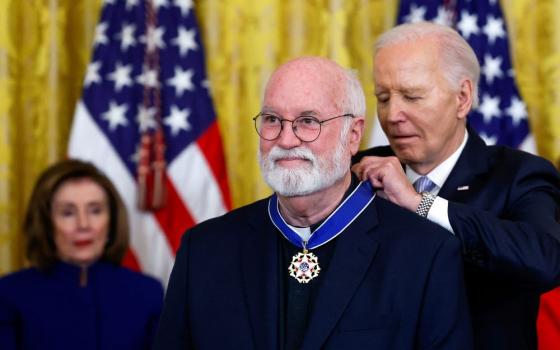Journalist’s diary and reporting document America’s original sin
ROI OTTLEY’S WORLD WAR II: THE LOST DIARY OF AN AFRICAN AMERICAN JOURNALIST
Edited by Mark A. Huddle
Published by University Press of Kansas, $29.95
Harlem’s “Striver’s Row,” the name given three blocks of handsome brownstones, was where the upper crust of the “Harlem Renaissance” lived when, as Langston Hughes wrote, “the Negro was in vogue.” That’s where Roi Ottley was born in 1906, the son of Caribbean immigrants and raised as a child of privilege. With his pals, the soon-to-be famous blues musician and composer W.C. Handy Jr. and the soon-to-be even more famous Congressman Adam Clayton Powell Jr., they formed a club called the Young Thinkers. They read books and competed with other Harlem debate teams on public issues.
In 1926, Ottley accepted a full track scholarship to St. Bonaventure University near Olean, N.Y., where for two years he thrived intellectually, got Bs, collected girlfriends, read Jack London and Rafael Sabatini, and met Franciscan Fr. Gerald McMinn, who encouraged him to write. Perhaps tempted by a “bigger world,” Ottley transferred to Michigan State, where he majored in literature with a concentration in journalism, but was barely tolerated as “an eccentric Negro who had yet to learn his station,” said one historian. He dropped out.
By 1932 the energetic Ottley was writing for Harlem’s Amsterdam News about theater, radio and sports, and pushing to unionize the paper. The union, the American Newspaper Guild, won, but the new owner dropped the strikers. Ottley moved to the New Deal’s WPA Federal Writers’ Project, to supervise research on the history of blacks in New York. World War II sharpened his interest in black internationalism and questions that Americans were slow to confront, such as why blacks should give their lives for a nation that did not give them equal rights, and why the native populations of colonial empires should support European white masters who denied them freedom. In 1944 Ottley convinced the liberal tabloid PM to take him as a freelance war correspondent.
Based on the Ottley papers in the St. Bonaventure archives, Georgia College history professor Mark A. Huddle combined an introduction, a seven-month 1944 journal, and 13 selections from Ottley’s reporting (1942-46) to produce Roi Ottley’s World War II. The result is an illuminating portrait of a forgotten black writer, and a thought-provoking documentary study of what has been called America’s original sin.
The portrait has shadows. Coworkers at the Federal Writers’ Project considered Ottley an arrogant dictator. Ralph Ellison wrote to Richard Wright that Ottley cared only about “the bar, the bed and the table,” and he lacked the political consciousness required to fully grasp American race relations. An obsessive self-promoter, Ottley based his first book, New World A-Coming, on his Federal Writers’ Project colleagues’ research but gave none any credit.
The journal entries and PM columns are not -- except for the steady London V-2 “buzz bombs” interrupting the terrified correspondent’s sleep -- foxhole spine-tinglers. In London and Paris he interviewed troops, ordinary citizens and government bigwigs about the role of blacks in the military or the war’s impact on colonial policy. Much of his “reporting” amounted to not much more than a black correspondent’s personal observations.
Huddle has prepared us for Ottley the snob. His first day in London, July 16, 1944, he was served breakfast tea in bed and declared himself free from the “boring” four fellow correspondents, all “such drips,” who shared his cabin on the boat. He had a few words in passing with Joe Louis and a long talk with Ernest Hemingway, who introduced him as one of America’s “outstanding Negro writers.” Ottley wrote in his diary that the British lower classes -- already into their fifth year of war -- looked “seedy” and “unkempt.” American soldiers and prostitutes swarm around Piccadilly Circus. On July 24, he arrived at Normandy beachhead, his stomach turned by the “hardly pretty sight” of floating arms, legs and torsos of men blown to pieces during the D-Day invasion six weeks earlier.
His PM July 31, 1944, report praises the work of “Negro soldiers who keep an avalanche of food, ammunition and troops moving steadily to the front.” Negro Signal Corps men climb telephone poles and repair communication lines. They cheerfully do the “backbreaking” work of repairing roads. He visits two Negro combat units -- artillery outfits, with clean camps, high morale, and good relations between the white officers and black enlisted men. A black soldier tells Ottley that the white boys see them working hard and understand that “we need each other.”
Two themes run through Ottley’s reporting. First, that the Jim Crow segregation of white and black American troops is scandalous and often at the brink of violence. The major racial confrontation had occurred a year before Ottley arrived in Britain. In 1943, “The Battle of Bamber Bridge,” in Lancashire, 200 miles north of London, erupted after a fracas when black American soldiers and white British soldiers and civilians supported a black man arrested without a pass. An American military policeman shot a black soldier in the back. The black soldiers broke into the arsenal, armed and barricaded themselves, and when the white officers approached, shot down four. The MPs surrounded the black encampment with machine guns. The diplomacy of a black lieutenant prevented a tragedy.
Second, despite stories like “Negro soldiers have tails,” black U.S. troops had the rare experience of being treated as equals by British and French citizens. When blacks returned home after the war to face Jim Crow again, America was in for another crisis.
After the war, Ottley moved to Chicago, shifted his politics to the right, and wrote a human interest column for the Chicago Tribune. There he married for the third time in 1951 and died of a heart attack nine years later at age 54.
In today’s military, white and black young men can fight and die equally in Iraq and Afghanistan. But in today’s society, more investigative journalism than Ottley ever achieved is needed to explore the root causes into the inequality that graduates illiterate young black males from high school as preparation, too often, for little more than becoming incarceration statistics.
[Jesuit Fr. Raymond A. Schroth is associate editor of America magazine and author of Bob Drinan: The Controversial Life of the First Priest Elected to Congress.]







